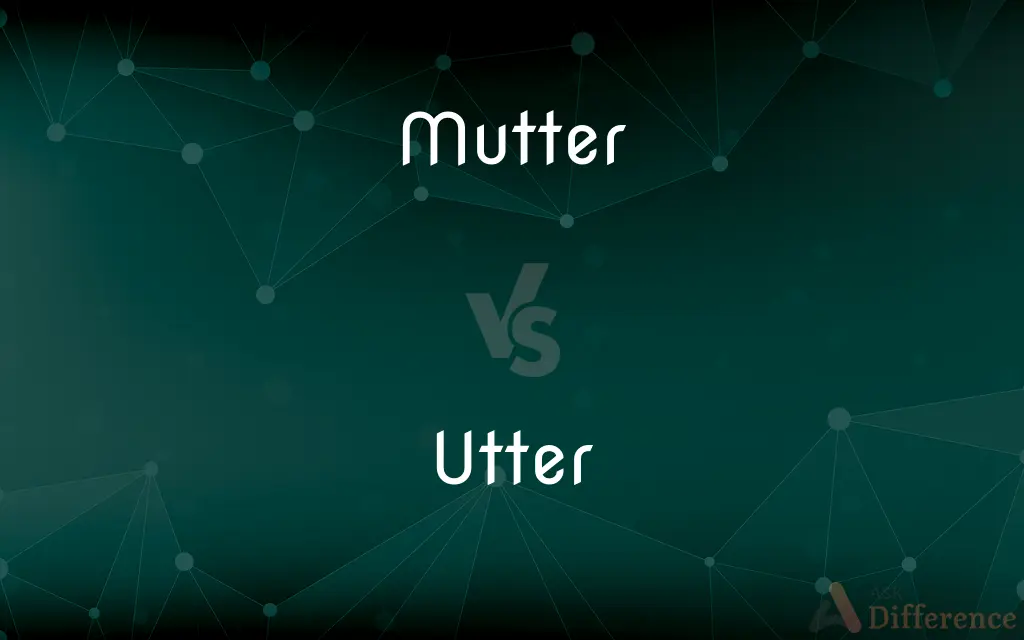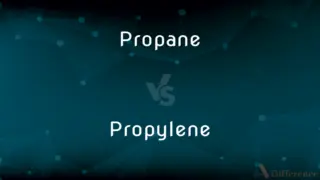Mutter vs. Utter — What's the Difference?
By Tayyaba Rehman & Maham Liaqat — Updated on April 5, 2024
Mutter involves speaking in a low, indistinct manner, often conveying dissatisfaction or hesitation, while utter means to speak or pronounce words clearly and distinctly.

Difference Between Mutter and Utter
Table of Contents
ADVERTISEMENT
Key Differences
Muttering is characterized by low, often unclear speech, typically used to express discontent, grumble, or speak without wanting to be heard distinctly. It is a form of vocalization that lacks clarity and is usually directed inward or meant for the speaker rather than an audience. For instance, someone may mutter under their breath in frustration or dissatisfaction. On the other hand, to utter is to vocalize sounds or words clearly and deliberately. It encompasses any form of spoken word, regardless of the content or emotion behind it, and is intended to be heard and understood by others.
While muttering is often associated with negative emotions or secrecy, uttering is neutral and simply denotes the act of speaking. Muttering can imply a reluctance to communicate openly or a desire to conceal one’s thoughts, whereas uttering has no such connotations and focuses on the clarity and audibility of speech.
In practical situations, muttering might be used in a context where someone is not confident in their words, choosing instead to speak them softly or unclearly. This contrasts with uttering, which is necessary for clear communication in formal settings, public speaking, and everyday conversations where understanding is key.
The distinction between muttering and uttering also reflects their social implications. Muttering can be seen as a sign of disrespect or lack of interest, especially in contexts where clear communication is expected. Uttering, especially when it comes to making statements or pronouncements, carries the weight of intention and the expectation of being heard and taken seriously.
Muttering and uttering serve different communicative purposes. Muttering is more personal, often reflecting an internal dialogue or emotional state, while uttering is about externalizing thoughts in a manner meant to be shared and understood by others.
ADVERTISEMENT
Comparison Chart
Definition
Speaking in a low, indistinct voice.
Speaking or pronouncing words clearly.
Connotation
Often negative or secretive.
Neutral, focusing on clear communication.
Intention
May indicate reluctance or dissatisfaction.
Intended for clear and effective communication.
Audibility
Low and unclear.
Clear and distinct.
Social Implication
Can be seen as disrespectful or disinterested.
Indicates intention and expectation to be understood.
Compare with Definitions
Mutter
Speaking quietly to oneself.
The scientist muttered to herself while solving the complex equation.
Utter
Making a sound with one's voice.
She uttered a sigh of relief.
Mutter
Grumble or speak without full vocalization.
She muttered under her breath during the meeting.
Utter
Articulate or pronounce with clarity.
The actor uttered the lines perfectly.
Mutter
To make a low, continuous sound.
The old machine muttered as it operated.
Utter
To say something aloud or pronounce words.
The teacher asked him to utter each word clearly.
Mutter
To speak softly and indistinctly, usually expressing dissatisfaction.
He muttered complaints about the assignment.
Utter
Making an audible statement.
The judge uttered the verdict with gravity.
Mutter
Expressing oneself in a barely audible manner.
Lost in thought, he muttered answers to the questions.
Utter
To express verbally.
He uttered his gratitude to everyone who helped.
Mutter
Say something in a low or barely audible voice, especially in dissatisfaction or irritation
‘I knew she was a troublemaker,’ Rebecca muttered
He muttered something under his breath
Utter
Complete; absolute
Charlotte stared at her in utter amazement
Mutter
A barely audible utterance, especially one expressing dissatisfaction or irritation
A little mutter of disgust
Utter
Make (a sound) with one's voice
He uttered an exasperated snort
Mutter
To speak indistinctly in low tones.
Utter
Put (forged money) into circulation.
Mutter
To complain or grumble morosely.
Utter
To send forth with the voice
Uttered a cry.
Mutter
To utter or say in low indistinct tones.
Utter
To articulate (words); pronounce or speak
Uttered "yes.".
Mutter
A low grumble or indistinct utterance.
Utter
(Law) To put (counterfeit currency or a forged check or instrument) into circulation
Utter a bad check.
Mutter
A repressed or obscure utterance; an instance of muttering.
The prisoners were docile, and accepted their lot with barely a mutter.
Utter
(Obsolete) To offer (merchandise) for sale; sell.
Mutter
(Indian cuisine) Peas.
Utter
Complete; absolute; entire
Utter nonsense.
Utter darkness.
Mutter
To utter words, especially complaints or angry expressions, indistinctly or with a low voice and lips partly closed; to say under one's breath.
You could hear the students mutter as they were served sodden spaghetti, yet again, in the cafeteria.
The beggar muttered words of thanks, as passersby dropped coins in his cup.
Utter
Outer; furthest out, most remote.
Mutter
To speak softly and incoherently, or with imperfect articulations.
The asylum inmate muttered some doggerel about chains and pains to himself, over and over.
Utter
(obsolete) Outward.
Mutter
To make a sound with a low, rumbling noise.
April could hear the delivery van's engine muttering in the driveway.
Utter
Absolute, unconditional, total, complete.
Utter ruin; utter darkness
Mutter
To utter words indistinctly or with a low voice and lips partly closed; esp., to utter indistinct complaints or angry expressions; to grumble; to growl.
Wizards that peep, and that mutter.
Meantime your filthy foreigner will stare,And mutter to himself.
Utter
(transitive) To produce (speech or other sounds) with one's voice.
Don't you utter another word!
Mutter
To sound with a low, rumbling noise.
Thick lightnings flash, the muttering thunder rolls.
Utter
(transitive) To reveal or express (an idea, thought, desire, etc.) with speech.
Mutter
To utter with imperfect articulations, or with a low voice; as, to mutter threats.
Utter
To produce (a noise) (of an inanimate object).
Sally's car uttered a hideous shriek when she applied the brakes.
Mutter
Repressed or obscure utterance.
Utter
To spit or blow (something) out of one's mouth.
Mutter
A low continuous indistinct sound; often accompanied by movement of the lips without the production of articulate speech
Utter
To emit or give off (breath).
Mutter
A complaint uttered in a low and indistinct tone
Utter
To shed (a tear or tears).
Mutter
Talk indistinctly; usually in a low voice
Utter
To offer (something) for sale; to sell.
Mutter
Make complaining remarks or noises under one's breath;
She grumbles when she feels overworked
Utter
To put (currency) into circulation.
Utter
To show (something that has been hidden); to reveal the identity of (someone).
Utter
To send or put (something) out.
Utter
To commit the crime of uttering knowingly presenting forged documentation.
Utter
Outer.
As doth an hidden mothThe inner garment fret, not th' utter touch.
Utter
Situated on the outside, or extreme limit; remote from the center; outer.
Through utter and through middle darkness borne.
The very utter part pf Saint Adelmes point is five miles from Sandwich.
Utter
Complete; perfect; total; entire; absolute; as, utter ruin; utter darkness.
They . . . are utter strangers to all those anxious thoughts which disquiet mankind.
Utter
Peremptory; unconditional; unqualified; final; as, an utter refusal or denial.
Utter
To put forth or out; to reach out.
How bragly [proudly] it begins to bud,And utter his tender head.
Utter
To dispose of in trade; to sell or vend.
Such mortal drugs I have, but Mantua's lawIs death to any he that utters them.
They bring it home, and utter it commonly by the name of Newfoundland fish.
Utter
Hence, to put in circulation, as money; to put off, as currency; to cause to pass in trade; - often used, specifically, of the issue of counterfeit notes or coins, forged or fraudulent documents, and the like; as, to utter coin or bank notes.
The whole kingdom should continue in a firm resolution never to receive or utter this fatal coin.
Utter
To give public expression to; to disclose; to publish; to speak; to pronounce.
The words I utterLet none think flattery, for they 'll find 'em truth.
And the last words he uttered called me cruel.
Utter
Articulate; either verbally or with a cry, shout, or noise;
She expressed her anger
He uttered a curse
Utter
Express audibly; utter sounds (not necessarily words);
She let out a big heavy sigh
He uttered strange sounds that nobody could understand
Utter
Express in speech;
She talks a lot of nonsense
This depressed patient does not verbalize
Utter
Put into circulation;
Utter counterfeit currency
Utter
Without qualification; used informally as (often pejorative) intensifiers;
An arrant fool
A complete coward
A consummate fool
A double-dyed villain
Gross negligence
A perfect idiot
Pure folly
What a sodding mess
Stark staring mad
A thoroughgoing villain
Utter nonsense
Utter
Total;
Dead silence
Utter seriousness
Common Curiosities
Can muttering be unintentional?
Yes, muttering can be an unintentional response to frustration, confusion, or concentration.
Is uttering specific to any form of speech?
Uttering is not limited to any specific content and refers broadly to the act of speaking or vocalizing clearly.
What does it mean to mutter?
To mutter means to speak in a low, often unclear voice, typically expressing dissatisfaction or reluctance.
How does uttering differ from muttering?
Uttering involves clear and distinct speech intended for others to hear and understand, unlike muttering, which is low and indistinct.
Can a person mutter and utter in the same conversation?
Yes, a person can switch between muttering (perhaps out of frustration) and uttering (to communicate clearly) within the same conversation.
How is uttering important in communication?
Uttering is crucial for effective communication as it ensures that the speaker’s words are clear and comprehensible to the listener.
How do cultural differences impact the perception of muttering and uttering?
Cultural norms can influence how muttering and uttering are perceived, with some cultures valuing direct and clear communication more highly than others.
What implications does muttering have in social settings?
Muttering in social settings can be perceived as rude or indicative of disinterest or disagreement.
How does context affect the interpretation of muttering and uttering?
The context can significantly influence how muttering and uttering are perceived; for example, muttering might be more acceptable in a casual setting among friends than in a formal presentation.
Why might someone mutter instead of speak openly?
Individuals might mutter due to lack of confidence, dissatisfaction, or the desire to keep their thoughts semi-private.
Is it possible to mutter intentionally?
Yes, individuals can mutter intentionally, often to convey their feelings subtly or to themselves without intending clear communication with others.
Can technology accurately capture and interpret muttering?
Technology like voice recognition software may struggle to accurately capture and interpret muttering due to its low volume and lack of clarity.
What role does body language play in muttering versus uttering?
Body language can amplify the message of muttering (e.g., frustration, secrecy) and uttering (e.g., confidence, openness), affecting how the message is received.
Can muttering be effective in storytelling or artistic expression?
Yes, muttering can add a layer of emotion or authenticity to storytelling or acting, conveying characters’ inner thoughts or feelings.
Why might someone be advised to utter instead of mutter?
Someone may be advised to utter for clarity and effectiveness in communication, especially in professional or educational contexts where understanding is crucial.
Share Your Discovery

Previous Comparison
Haggle vs. Barter
Next Comparison
Propane vs. PropyleneAuthor Spotlight
Written by
Tayyaba RehmanTayyaba Rehman is a distinguished writer, currently serving as a primary contributor to askdifference.com. As a researcher in semantics and etymology, Tayyaba's passion for the complexity of languages and their distinctions has found a perfect home on the platform. Tayyaba delves into the intricacies of language, distinguishing between commonly confused words and phrases, thereby providing clarity for readers worldwide.
Co-written by
Maham Liaqat















































